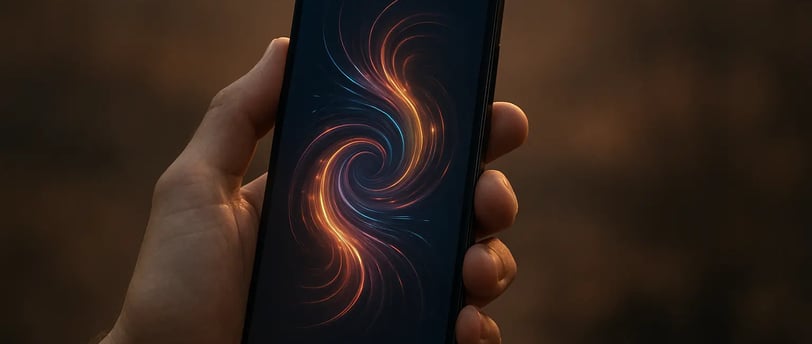Apple’s AI App Store Leak: Is This the Next Big Revolution in Artificial Intelligence?
Apple’s AI App Store leak could signal a new artificial intelligence era. Discover what it means for privacy, on-device AI, and how Apple is quietly fueling the next big AI revolution.
TECHNOLOGY & INNOVATION
Billys Zafeiridis
7/18/20254 min read


When the Future Knocks Quietly (But Persistently)
Most tech rumors come and go without changing much—just a blip in the endless scroll. But sometimes, a leak feels different. Not because it’s flashy or dramatic, but because it hints at a new way we’ll live, work, or trust our devices.
That’s the vibe around the Apple AI App Store leak. It’s not about colors or cameras this time. It’s about control, privacy, and who gets to shape your digital life. If you’ve ever felt uneasy about where your data goes—or wished your phone would just “get you” without snooping—this story’s worth your attention.
The Leak: What’s Really Going On at Apple?
It started quietly: developers and tech writers noticed strange new references in iOS code and Apple’s own documentation. The signs pointed to a new kind of App Store—one dedicated solely to AI. But this isn’t about more cloud-powered assistants. It’s about on-device AI models running right on your iPhone, iPad, or Mac—no cloud, no outside servers, no digital eavesdropping.
Apple confirmed the whispers at WWDC 2025, introducing its Foundation Models API: a set of tools for developers to integrate and deploy advanced AI locally on your device. Your prompts, voice memos, even images—all processed privately, on your own hardware.
Why It Matters: Privacy, Agency, and a Real Shift
It’s no secret Apple’s been playing catch-up with AI. Google and OpenAI have been loud about their AI upgrades. But Apple, true to form, is quietly focused on privacy by default. According to Wired, Apple is betting that privacy is not just a nice-to-have, but the real game changer.
The key shift? On-device AI means your information never leaves your pocket. Live translation, message screening, productivity hacks—done privately, instantly, locally. If you care about digital wellbeing, this is huge.
For Developers: The Birth of a New AI Ecosystem
Here’s the kicker: Apple is opening this tech to the world of developers. With the Foundation Models API, third-party creators can now build AI apps and features that don’t need a data center in the sky (developer.apple.com). We’re already seeing first-gen on-device AI apps in the App Store, and MacRumors plus ArcTouch confirm the excitement (and challenges) among developers.
This could spark an App Store-style gold rush—except now, instead of picking your favorite calendar or weather app, you’ll pick your favorite AI, personalized for how you think, work, or create.
The Human Angle: How Will It Change Everyday Life?
Here’s where it gets personal. If you’ve ever worried about what data your AI is storing—or felt boxed in by “one-size-fits-all” assistants—this could be liberating. You’ll be able to choose AI that writes poems, brainstorms, helps you focus, or even just listens, all while keeping your private life truly private.
But with freedom comes new questions: Which AI can you trust? Will you try ten and stick with one, or always be searching for the perfect fit? For me, this is a chance to use tech intentionally—to try, observe, and choose what genuinely helps, instead of just accepting what’s built-in.
Mindful Recommendations: Books, Tools, and Calm
In times of digital revolution, I find a few analog or thoughtful supports help ground me:
Book: One resource that helped me process my own restlessness and curiosity was AI 2041: Ten Visions for Our Future. It weaves stories and insight into what’s actually coming—without hype.
Focus Tool: For intentional, mindful work sessions (especially when testing all these new AI features), I keep a Timeqube Classic Focus Timer on my desk. It’s tactile, silent, and totally distraction-free.
Meditation Support: To counter digital overwhelm, a good meditation cushion helps more than you’d think. I like the KIMJALY Zafu Meditation Cushion—firm, supportive, and a daily reminder to return to breath, not screens.
Not Just Hype: Some Healthy Skepticism
Of course, caution is wise. Not every Apple rumor changes the world overnight. Reuters points out that Apple’s rollout is measured and regulatory, not wild-west. Investopedia notes some features (like a smarter Siri) are still delayed.
Tech rarely transforms everything at once. But the signs—developer APIs, first AI apps, a privacy-first focus—mean the real revolution might be quiet, gradual, but deeply personal.
Reflective Close: The Revolution Is Choice
So, is this leak the next big AI revolution? Maybe not in one grand, cinematic moment. But the shift is real: away from passive tech and toward something you can choose, trust, and shape.
If you could design your own personal AI, what would it do—or never do? Would you swap out assistants the way you change playlists, or is one enough? I’m curious. Maybe that’s what the next era is really about: not faster tech, but more mindful, conscious digital lives.
You May Also Enjoy Reading:
If you’re curious about where the line between wonder and distraction falls, you may also enjoy reading:
Tech That Feels Like Magic (But Isn’t): The Mindful Approach to Modern Gadgets
Some of the links above are affiliate links. If you choose to make a purchase through them, I may earn a small commission—at no extra cost to you. Thank you for supporting mindful content like this.
References & Further Reading
Harmony
Embrace technology for personal growth and balance.
Connect
Inspire
contact@digitalzenzone.com
This site contains affiliate links. As an Amazon Associate — and participant in other affiliate programs — we may earn commissions from qualifying purchases, at no extra cost to you.
© 2024 Digital Zen Zone. All rights reserved.
